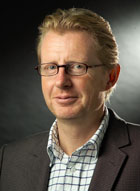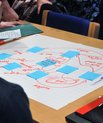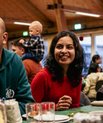How do you get DKK 60 million in research funds?
Professor Michael Rosholm offers an insight into the process that led to the DKK 60 million grant that he, together with an interdisciplinary team, received from TrygFonden last week.
??Friday 30 November was a good day for Professor Michael Rosholm from the Department of Economics and Business at BSS. Here it was announced that his new interdisciplinary centre for research into well-being among children and young people had been granted no less than DKK 60 million from TrygFonden to conduct research, over the next six years, into which initiatives work and which do not in terms of improving the well-being of children and young people.
?We asked Michael Rosholm about how he managed to apply for a grant of this size involving such a high degree of interdisciplinarity, what plan B was, and what he felt afterwards.
?- When we learnt that TrygFonden was considering such a project, we first looked into what was going on internally at other AU departments in this area of research and soon contacted one of the experts in our own field, James J. Heckman (Nobel laureate and Professor at the University of Chicago, ed.) as well as the public authorities, who are ultimately responsible for the implementation of things in order to create a strong basis, says Michael Rosholm.
- The key is thorough preparation, involving a great deal of people to get a broad perspective, and getting the necessary help as soon as possible. The Research Support Office has been of great help in relation to the application process, the budget and so on, he says.
?How is it possible to manage so many different disciplines?
The new centre headed by Michael Rosholm will be studying the effectiveness of social initiatives aimed at children and young people. The centre combines expertise and players from a large number of institutions and fields (see facts at the bottom of the article), which makes it a huge managerial task.
?- We have established a management team representing all the fields. The team meets on a regular basis, which makes it possible for us to divide the responsibility and managerial task between us. In addition, each sub-project has a team leader who keeps the rest of the management updated, and we are also going to introduce a review process, which will ensure a high quality for all the projects in which we are involved, says Michael Rosholm.
?Although the research centre consists of many different disciplines, the idea is that the participants are to be at the centre on a regular basis in order to reap the benefits of the interdisciplinary co-operation. The centre will be located at Fuglesangs Allé.
?And if you had not received the grant?
?It has taken more than a year to prepare the necessary applications and reports for TrygFonden. A long process that could also have resulted in a refusal.
?- If we had been met with a refusal, our plan B would have been to proceed as if we had received the money, just on a slightly smaller scale. Many exciting projects have been initiated, many people are working on the projects, and the framework for the centre was almost in place, so we would have applied for some other funds and tried to continue according to plan. And, of course, we would have tried to join forces with those who had received the grant, says Michael Rosholm.
?The project was discussed with the management at BSS on a regular basis, so everyone knew about the possibilities and the scope in relation to the number of hours it would take to prepare the application for TrygFonden. Michael Rosholm's centre project was pre-qualified in March and thus received DKK 500,000 to complete the final application.
?Do you have butterflies in your stomach?
Besides the funds provided by TrygFonden, Aarhus University will be injecting DKK 24 million and other partners contribute a further DKK 5 million. A total of DKK 89 million thus makes it financially possible for the research group, over the next five years, to get to the bottom of the important area of well-being among children and young people.
?- It is definitely very exciting to be heading this. It is a great responsibility, and I will probably be experiencing some degree of pressure. But I believe that it has also been fun and educational for everyone involved to develop ideas and decide on a common thread in the project. I have also joined forces with talented people who are of great help in connection with research management and administrative tasks, so that I can mainly focus on the research itself, says Michael Rosholm.
?About the centre for research in well-being among children and young people
Michael Rosholm and other researchers from Aarhus University are to conduct the interdisciplinary research in collaboration with the Centre for Child Language at the University of Southern Denmark, The Danish Institute for Local Government Analysis and Research (KORA), the Danish Ministry of Children and Education, the Danish Ministry of Employment, the Danish National Board of Social Services, Central Denmark Region, the City of Aarhus, VIA University College, Rambøll Management and the Capital of Children (the Lego Foundation and the Municipality of Billund).
?Further information
Michael Rosholm
Professor, Department of Economics and Business
School of Business and Social Sciences
Aarhus University
?M: rom@asb.dk
T: (+45) 8716 4832









